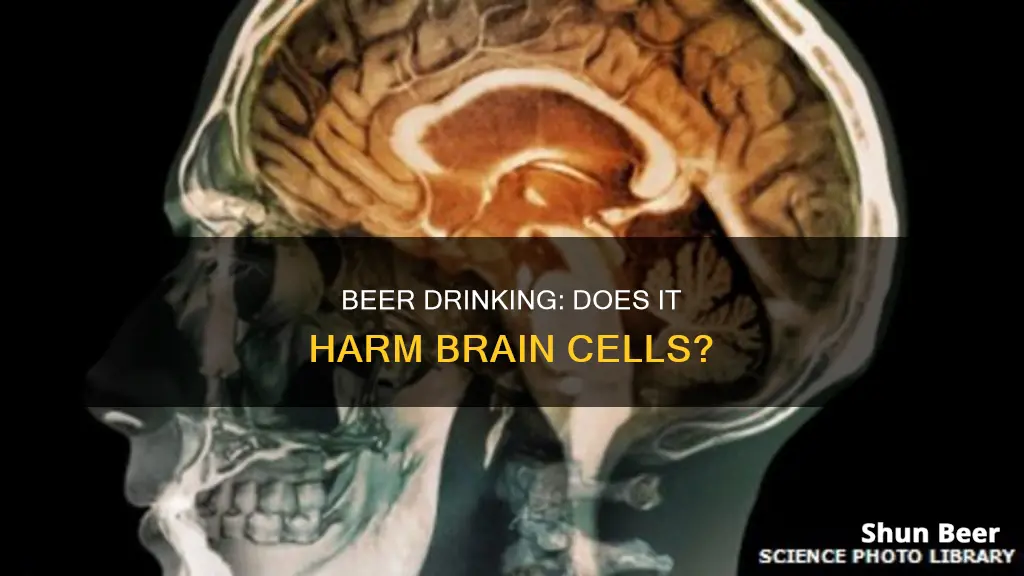
Alcohol is a neurotoxin that can have detrimental effects on brain cells and overall brain function. While it does not directly kill brain cells, it can damage them and impair their function, leading to short- and long-term cognitive and behavioural impairments. This damage is reversible, and the brain has been shown to heal and regenerate cells following periods of alcohol abstinence. So, does drinking beer kill brain cells? The answer is no, but that doesn't mean alcohol doesn't have a significant impact on brain health.
| Characteristics | Values |
|---|---|
| Does drinking beer kill brain cells? | Experts believe that drinking does not lead to brain cell death, but it does have adverse effects on the brain. |
| Effects of drinking beer | Endorphin release, interference with communication pathways, changes in mood and behavior, decreased cognitive function, memory issues, shrinkage of the hippocampus, interference with neurogenesis, Wernicke-Korsakoff syndrome, etc. |
| Reversibility of effects | Most of the effects of alcohol on the brain are reversible if one stops drinking. |
What You'll Learn

Alcohol is a neurotoxin
Alcohol is toxic to a developing brain during pregnancy and can cause congenital disabilities, including developmental disorders. It can also lead to fetal alcohol spectrum disorders (FASDs), which interfere with the brain's growth and development, leading to lifelong physical, mental, and behavioral problems.
Alcohol can affect the brain in both the short and long term, even in moderate amounts. It enters the bloodstream immediately and reaches the brain within five minutes of drinking it. It triggers the release of endorphins, which is why light-to-moderate drinkers feel more relaxed, sociable, and happy when drinking. However, heavy or binge drinking can interfere with the brain's communication pathways and affect how the brain processes information.
Alcohol can cause shrinkage in the hippocampus, the area of the brain associated with memory and reasoning. It can also interfere with neurogenesis, the body's ability to make new brain cells.
Chronic heavy alcohol consumption can damage the prefrontal cortex, hippocampus, and cerebellum, regions involved in executive functions. It can also lead to Wernicke-Korsakoff syndrome, a disease that causes permanent brain damage and memory loss due to vitamin B1 deficiency.
Alcohol's neurotoxic effects can lead to diverse neurological conditions and cause damage to many parts of the central and peripheral nervous systems. These include alcohol-associated dementia, Wernicke-Korsakoff syndrome, alcoholic cerebellar degeneration, pellagra encephalopathy, alcoholic myopathy, and hepatic encephalopathy.
While the long-term effects of alcohol on the brain can be serious, most of the damage is reversible if the person stops drinking. Even brain atrophy can start to reverse after a few weeks of abstinence. However, it may take longer for the brain to recover from the damage caused by excessive alcohol consumption, and some long-term alcoholics may suffer more permanent effects.
Beer and Surgery: What's Safe to Drink?
You may want to see also

It doesn't kill brain cells but damages dendrites in the cerebellum
While drinking alcohol does not kill brain cells, it can still have a negative impact on brain function. Alcohol is a neurotoxin that can affect brain cells directly and indirectly. It can interfere with neurogenesis, the process of forming new brain cells, and can also lead to a thiamine deficiency, causing the neurological disorder Wernicke-Korsakoff syndrome. This syndrome is characterised by confusion, memory loss, and a lack of muscle coordination.
Chronic alcohol consumption has been found to alter neuronal dendritic spines in the brain's reward centre, the nucleus accumbens. This can result in a decrease in the density of dendritic spines and an increase in spine head size. These changes may contribute to the transformation of spines and the alteration of microcircuitry for glutamate reception. Additionally, alcohol can cause dendrites to become thicker, beaded, and misoriented in their projection. These structural changes to the dendrites may be permanent and can lead to cognitive problems such as impulsivity, emotional dysregulation, anxiety, and depression.
The effects of alcohol on the brain can vary depending on factors such as the amount and frequency of consumption, the duration of alcohol use, prenatal exposure, and overall health. However, it is important to note that the damage caused by alcohol to the brain is mostly reversible if the individual stops drinking.
Celiac-Friendly Dark Beer: What You Need to Know
You may want to see also

Heavy drinking can cause Wernicke-Korsakoff syndrome
Heavy drinking can lead to Wernicke-Korsakoff syndrome (WKS), a severe and life-threatening brain disorder. WKS is caused by a vitamin B1 (thiamine) deficiency, which is common in individuals with poor nutrition and long-term, heavy alcohol use. Alcohol irritates the stomach and digestive tract, interfering with the body's ability to absorb and retain thiamine.
WKS is comprised of two conditions: Wernicke's encephalopathy and Korsakoff's psychosis. Wernicke's encephalopathy is a severe and temporary condition characterised by confusion, loss of muscular coordination, abnormal eye movements, and vision changes. Korsakoff's psychosis is a persistent, chronic condition that causes significant impairment in learning and memory, often interfering with a person's ability to function normally.
The symptoms of WKS can be reversed if caught early and treated promptly with thiamine supplementation. However, if left untreated, WKS can lead to irreversible complications, including permanent memory loss, confusion, difficulty with muscle coordination, and hallucinations. It can also result in reduced consciousness, coma, or even death.
The prevalence of WKS across populations is not well established, but researchers estimate that it may remain undiagnosed in approximately 80% of patients. It is important to seek immediate medical attention if you or someone you know exhibits symptoms of WKS.
The Science of Nitro Beers: How Do They Work?
You may want to see also

Alcohol inhibits neurogenesis
Alcohol is a neurotoxin that can affect brain cells directly and indirectly. It can interfere with adult neurogenesis through multiple mechanisms, including by altering neurotransmitters, CREB and its downstream effectors, and the neurogenic niche.
Alcohol's effects on neurotransmitters, such as glutamate and serotonin, can impact neurogenesis. Glutamate is a neurotransmitter that is critical for learning and memory, and alcohol can inhibit NMDA receptors, which can decrease adult neurogenesis. Serotonin is also important for regulating adult neurogenesis, and alcohol can disrupt serotonin synthesis or injure serotonin-releasing neurons, leading to decreased neurogenesis.
Alcohol can also affect neurogenesis by influencing growth factors, which are proteins that bind to neurons and regulate neurogenesis. Alcohol may disrupt the secretion of growth factors or their targets or receptors. For example, alcohol can inhibit the growth factor IGF-1, which increases adult neurogenesis during exercise.
In addition, stress can decrease neurogenesis, and alcohol consumption can be a stressor that activates the HPA axis and increases glucocorticoid levels, which can suppress NSC proliferation.
Overall, alcohol's effects on neurogenesis are complex and involve multiple mechanisms. The disruption of neurogenesis by alcohol may contribute to the neurodegeneration and cognitive impairments associated with chronic alcohol consumption.
Beer and Hives: Is There a Connection?
You may want to see also

Alcohol can cause brain shrinkage
A 2017 study found that even moderate drinking can have similar effects on the brain. Moderate drinking is typically defined as one drink a day for females and one or two drinks a day for males. The study showed that people who drank the equivalent of four drinks a day had almost six times the shrinkage as nondrinkers. Moderate drinkers had three times the risk of shrinkage than nondrinkers.
The hippocampus, the area of the brain associated with memory and reasoning, is particularly affected by alcohol consumption. The amount of shrinkage in this region appears to be directly related to the amount of alcohol consumed.
While alcohol doesn't kill brain cells, it can negatively impact them long-term. For example, too much alcohol can interfere with neurogenesis, which is the body's ability to make new brain cells. Additionally, heavy drinking can lead to a thiamine deficiency, resulting in a neurological disorder called Wernicke-Korsakoff syndrome, which causes a loss of neurons in the brain.
The good news is that most of the long-term effects of alcohol on the brain are reversible if you stop drinking. Even brain atrophy can start to reverse after a few weeks of avoiding alcohol.
Beer and Metformin HCL 500 mg: Safe Mix?
You may want to see also
Frequently asked questions
Experts believe that drinking does not lead to brain cell death, but it does have an impact on brain function and can cause brain damage. Alcohol is a neurotoxin that can disrupt the communication of the brain and affect brain cell functions, leading to intellectual impairment, memory loss, and other issues.
Long-term alcohol abuse or heavy drinking can lead to various adverse effects on the brain, including a decrease in motor skills, memory loss, anxiety, depression, and insomnia. Additionally, it can cause brain shrinkage, particularly in the hippocampus, which is associated with memory and reasoning abilities.
The human brain has a remarkable capacity for recovery and regeneration. Studies have shown that abstaining from alcohol can lead to improvements in brain structure and cognitive function. The brain can heal and regenerate brain cells, but the recovery process is complex and individualized and may require extended periods of abstinence.







